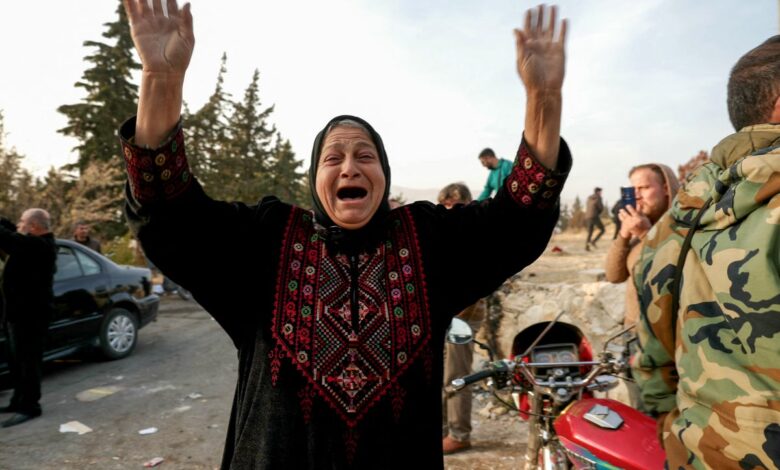‘They tortured me when I asked to see him’: Horrors of Assad’s ‘slaughterhouse’ jail revealed

Camping in the grounds of Syria’s most notorious “slaughterhouse” prison north of Damascus and scouring the halls of overflowing hospitals and morgues, desperate relatives search for Syria’s missing.
Clutching photos, identification cards, and screenshots of old images, families of those swallowed into the regime’s notorious jails and judicial system flock to anyone they think might shed light on the whereabouts of their loved ones.
More than half a century of brutal rule by the Assad regime, culminating in thirteen years of civil war, has been marked by mass arrests, enforced disappearances, extrajudicial killings, and executions resulting in tens of thousands missing.
Many have ended up in Syria’s various harsh and isolated prisons, like Saydnaya, nicknamed the “death camp.” Located 30 km north of the capital, Damascus, Amnesty International has described it as the final destination for both peaceful protesters and those defecting from the army.
After footage spread across the country showing rebels storming the complex and freeing inmates on Sunday, families from across Syria used the last of their fuel to drive to the notorious prison in search of their loved ones.
With nowhere to go, many are sleeping on mattresses outside the gruesome complex, which is littered with sewage and the scant belongings of inmates. Some are digging with their hands or trying to knock through walls, chasing rumours of underground prisons and secret cells.
Clutching photos and ID cards, families of those swallowed into the regime’s notorious jails and judicial system search for the whereabouts of their loved ones (AP)
“Please, I am trying to find my son Enad, who disappeared 12 years ago,” a woman sobs, grabbing my arm. Another man, Zakaria, himself an ex-detainee, shouts: “Seven of my family are missing. Their photos are in the records here at the prison. They must be here.”
A man standing behind, holding a wad of prison papers with names written on them, says he can’t find his brother-in-law, who disappeared after attending a protest in the southern province of Daraa in 2011. His friend, trying to make sense of what looks like a map of the prison grounds, says he lost his own brother in Daraa three years later; he had gone out to buy a gas canister and never returned.
The International Commission on Missing Persons (ICMP) said that at least 150,000 people are believed to be missing due to conflict in Syria, and that already, families have been reunited after the stunning overthrow of Bashar al-Assad over the weekend.
The global intergovernmental organisation has already collected data from more than 76,200 relatives of missing persons, who have reported 28,200 cases and received reports of 66 mass grave sites .
Now is the time, the group says, for the world to coordinate its genetic and database technology to find Syria’s missing.
“For justice to prevail in Syria, steps must be taken now—in the midst of present events—to protect evidence,” they added, imploring that places where executions and other human rights violations occurred be treated as crime scenes. “They must be sealed and, in due course, examined to protect the truth and bring those responsible for crimes to justice.”

The International Commission on Missing Persons (ICMP) said that at least 150,000 people are believed to be missing due to conflict in Syria (AP)
Unfortunately, that was not the case at Saydnaya, where angry and desperate families stood surrounded by smashed CCTV cameras, surveillance screens, and mutilated computer mainframes and hard drives.
“They took 40 working screens and the storage drives only to cover up for Bashar al-Assad and his criminals,” says Wali Subhi Nassar from Aleppo, crying tears of frustration.
“About a month ago, a soldier informed me that my brother was in Saydnaya. Now, that soldier has vanished, and all contact with him has been completely cut off.
“We will keep pursuing these criminals until the very end. I didn’t hold hatred for them, nor have I ever carried a weapon in my life, but now I will hunt them down,” he says as another man tries to comfort him.
Families who have given up on the prison flood the nearby hospitals like Al-Mouwasat for clues about their missing relatives. Hearing reports of prisoners so badly tortured they have forgotten their names and lost their minds, they run between rooms of injured people, begging nurses and medics for news of any of those released from prison. They stream out of a room on the fourth floor, where two men are being treated for gunshot and torture wounds after being freed from prisons in Homs and Damascus—only to find they have already been claimed by their families.
Alaa, a mother of six, is one of the lucky few: she nurses her husband, Muhammed, 38, one of the two men had just been freed from Saydnaya on Sunday who lies unconscious next to her.

At Saydnaya, angry and desperate families stand surrounded by smashed CCTV cameras as Assad officials smashed everything as they fled (AP)
The family had initially fled to Lebanon but returned to Syria in 2014 because they had no money, food or schooling for their children. Her husband was immediately conscripted into al-Assad’s army but tried to desert multiple times. Eight months ago, he was eventually transferred to Saydnaya.
There, Alaa says, he was badly tortured and eventually shot in the shoulder as the regime retreated.
“They never let me see my husband. They used to torture me every time I asked to see him,” she says in tears. “When I heard he was released, I started crying, along with the children. My children were crying and happy that their father had been released.”




